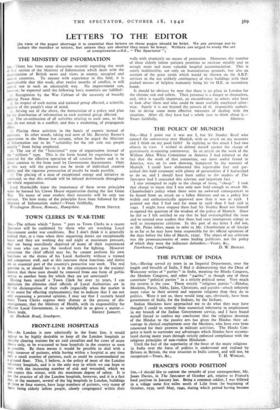THE • FUTURE OF INDIA
SIR,—Having served 25 years in an Imperial Department, over the length and breadth of India, I find it disheartening that the Dean of Worcester writes of " parties " in India, meaning the Hindu Congress, the Moslem Congress, and other " parties," as though any of these constitute " political parties " in a strictly political sense. Very much the reverse is the case. These strictly "religious parties "—Hindus, Moslems, Parsis, Sikhs, Jains, Christians, and pariahs—attach infinitely more value to their several and separate religions than they do to politics. Were it not so, there would long ago, obviously, have been government of India, for the Indians, by the Indians.
Indian Moslems have approached me to do what they may have thought I could to remedy their numerical inferiority in employment in my branch of the Indian Government service, and I have found myself forced to confess my conclusion that the religious devotion of the Hindus to the passive arts has given the Hindus their ad- vantage in clerical employment over the Moslems, who have ever been renowned for their prowess in militant activities. The Hindu Con- gress is loath to surrender any advantages which Hindus have accumu- lated during many years through strictly enforced compliance with the religious principles of non-violent Hinduism Until the fact of the superiority of the force of the many religions in India over the force of politics is understood and realised by Britons in Britain, the true situation in India cannot, and will not, be






























 Previous page
Previous page